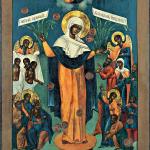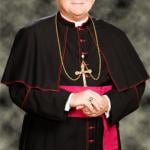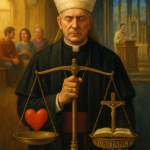Washington D.C., Nov 6, 2014 / 08:41 pm (CNA/EWTN News).- In the wake of an intense Synod on the Family, a leading voice supporting admission to Communion for divorced and remarried Catholics said different sides on Church debates should not use Pope Francis' words to bolster their own agenda. Speaking at the Catholic University of America in Washington, D.C. on Nov. 6, Cardinal Walter Kasper aimed to explain Pope Francis and his pontificate. The emeritus president of the Pontifical Council for Promoting Christian Unity spoke as the recipient of the 2014 Johannes Quasten Award. In attempting to understand the Pope, and countering the “critical voices that say this Pope does not please us” that may “undermine” Pope Francis, Cardinal Kasper cautioned against seeing the Pope in “progressive” or “conservative” conceptions “which each try to appropriate Pope Francis in their own way.” “That can happen if one claims him for their own reform concepts, especially those who are widespread in the Western World,” the cardinal said of attempts to appropriate the Pope’s teachings. Recently, the cardinal has claimed Pope Francis’ support for his writings and work on grace and pastoral approaches to modern issues facing Catholics in the West. Cardinal Kasper has been hailed as “the Pope's theologian” since Francis' accession, because in his first Angelus address, delivered March 17, 2013, the Pope stated that “in the past few days I have been reading a book by a Cardinal — Cardinal Kasper, a clever theologian, a good theologian — on mercy. And that book did me a lot of good, but do not think I am promoting my cardinals’ books! Not at all! Yet it has done me so much good, so much good.” Yet some of Cardinal Kasper's statements – particularly those proposing changes to the Church’s practice surrounding the reception of the Eucharist by the divorced and remarried – have been the subject of intense debate and controversy. Before the recent Synod on the Family – a gathering of bishops in October which discussed pastoral challenges to families – Cardinal Kasper argued against the use of the term “adultery” to describe a couple living together in a civilly married state after a previous civil divorce. He said that civilly divorced and remarried couples would “feel insulted and offended.” The Church’s use of the term “adultery” stems from Jesus’s words in the Gospel, where Christ teaches that “Everyone who divorces his wife and marries another commits adultery.” The cardinal has also said that while two divorced persons living together as a couple “as brother and sister,” as is required by the Church for divorced and civilly remarried couples merits “high respect,” it is not to be expected for all people. Living according to the Church’s teachings is “a heroic act, and heroism is not for the average Christian,” Cardinal Kasper said during a May interview in Commonweal magazine. And when asked in October about the Church’s teachings on the immorality of contraception, affirmed in Bl. Paul VI's “Humanae vitae”, Cardinal Kasper advocated that while the former Pope's writings were “an ideal” that should be told to people, “we have also to respect the conscience of the couples.” The cardinal has argued that there is “an abyss” between the Church’s teachings and most Catholics’ lived actions, saying that the Church should “listen to people living family life.” Continuing his address at CUA, Cardinal Kasper maintained that “Pope Francis does not fit into our rather worn-out scheme of progressive or conservative.” So who is Pope Francis? asked the cardinal. He is a reformer who has placed the “message of God’s mercy” at the center of his pontificate and who believes in a “theology of the people,” Cardinal Kasper answered himself. “Mercy has become the theme of his pontificate,” said the cardinal who was once bishop of Rottenburg-Stuttgart, adding that “justice is the minimum of mercy we owe to our fellow man. Mercy is the maximum of justice of what I, as a Christian, can do to another human being who needs me.” Citics pointed out that while Cardinal Kasper and most of his fellow German bishops have been leading the charge to allow those who are divorced and remarried to receive Communion, they have simultaneously denied the sacraments, including even Confession, to those who opt out of paying Germany’s “church tax”: a position seen by critics as hyprocritical, or saying that mercy comes at a price. In his address, Cardinal Kasper also argued that Pope Francis can be better understood “against the background” of Argentine liberation theology as a “theology of the people and of their culture.” “It does not want to instruct the people, but to listen to their wisdom,” he said. “On the basis of this theology, (Francis) is averse to all clericalism. He wants the participation of the whole people of God in the life of the Church, as well as men, laity, and clergy, young and old. He stresses the importance of the sensus fidei and says the Church must open its ears to the people. Pope Francis wants a magisterium that is a listening magisterium.” As a reformer Pope, Francis wishes to reach back to the Gospel not as a retreat but as a return to “a source and a strength” for renewal, he maintained. “By building a bridge back to the origins, Pope Francis is constructing a bridge to the future.” And as a Jesuit, Pope Francis reflects the spirituality of the founder of his order, St. Ignatius of Loyola. “He is not, for example, a Franciscan in disguise. He is a Jesuit through and through,” the cardinal said to laughter from the audience. “The spirit of Ignatius of Loyola, the father of his order, begins with a concrete situation, seeks to asses it according to the rules of discernment of spirits as described in the Book of Spiritual Exercises, and then arrives at a concrete, practical position.” Read more















